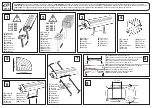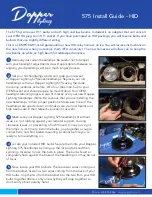
{
CAUTION:
If something is between an occupant and an
airbag, the airbag might not inflate properly
or it might force the object into that person
causing severe injury or even death. The path
of an inflating airbag must be kept clear. Do
not put anything between an occupant and an
airbag, and do not attach or put anything on
the steering wheel hub or on or near any other
airbag covering. Do not let seat covers block
the inflation path of a side impact airbag.
When Should an Airbag Inflate?
The driver’s and right front passenger’s frontal airbags
are designed to inflate in moderate to severe frontal or
near-frontal crashes. But they are designed to inflate only
if the impact exceeds a predetermined deployment
threshold. Deployment thresholds take into account a
variety of desired deployment and non-deployment
events and are used to predict how severe a crash is
likely to be in time for the airbags to inflate and help
restrain the occupants. Whether your frontal airbags will
or should deploy is not based on how fast your vehicle is
traveling. It depends largely on what you hit, the direction
of the impact and how quickly your vehicle slows down.
In addition, your vehicle has “dual stage” frontal airbags,
which adjust the restraint according to crash severity.
Your vehicle is equipped with electronic frontal sensors
which help the sensing system distinguish between
a moderate and a more severe frontal impact.
For moderate frontal impacts, these airbags inflate
at a level less than full deployment. For more severe
frontal impacts, full deployment occurs. If the front of
your vehicle goes straight into a wall that does not
move or deform, the threshold level for the reduced
deployment is about 12 to 20 mph (19 to 33 km/h),
and the threshold level for a full deployment is about
21 to 25 mph (34 to 40 km/h). (The threshold level can
vary, however, with specific vehicle design, so that it
can be somewhat above or below this range.)
1-77
Summary of Contents for 2006 Rendezvous
Page 5: ...These are some examples of symbols that may be found on the vehicle v...
Page 6: ...NOTES vi...
Page 30: ...Put someone on it Get it up to speed Then stop the vehicle The rider does not stop 1 24...
Page 145: ...NOTES 3 3...
Page 146: ...Instrument Panel Overview 3 4...
Page 278: ...NOTES 3 136...
Page 326: ...NOTES 4 48...
Page 338: ...When you lift the hood of the 3 6L V6 engine here is what you will see 5 12...
Page 464: ...NOTES 7 16...
















































